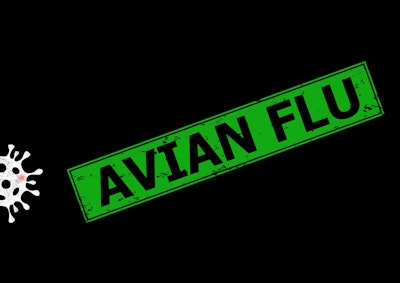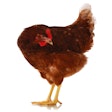
In Europe, outbreaks of highly pathogenic avian influenza (HPAI) are reported in three commercial poultry flocks in Bulgaria, and one in western Russia. In France, the government has provided further details about the current nationwide HPAI vaccination program.
So far this year, there have been 388 outbreaks of HPAI in commercial poultry in 22 European Union (EU) member states and neighboring countries. This is according to the Animal Disease Information System by the European Commission (EC; dated October 13).
This source includes two areas that are not generally considered to belong to the continent of Europe. As a result, these totals include two outbreaks in Turkey (Tűrkiye) as well as one in the French overseas territory of Reunion, which is located in the western Indian Ocean.
Since the EC’s previous update on October 6, the first outbreak of 2023 has occurred in Norway, and Poland’s total outbreaks increased by one to 62.
Of the total, the country with the most outbreaks — 152 — continues to be France, although the number of outbreaks has not increased since July. Next comes Hungary, with 79 outbreaks for the year to date, unchanged since April.
For comparison, 24 nations registered a total of 2,321 outbreaks in commercial poultry flocks through this system during 2022.
Farms hit by HPAI in Bulgaria, Russia
Since mid-October, three HPAI outbreaks have occurred across Bulgaria.
Following a six-month hiatus, an H5 HPAI virus has been detected at one commercial farm in the northern province of Veliko Tarnovo, and another in Pazardzhik in the south-west of the country. Affected were flocks of around 395,000 and 172,000 poultry, respectively.
In recent days, the national food safety authority, BFSA has confirmed that a third commercial farm has been affected. Located in the southern province of Haskovo, this is reported to have had almost 40 million birds.
According to this source, all three of these facilities were breeding farms producing laying hens.
Also officially registering the first cases of HPAI following a hiatus is the Russian animal health agency.
Latest notification to the World Organisation for Animal Health (WOAH) confirms the presence of the H5N1 HPAI virus serotype at a farm with more than 716,000 domestic poultry.
In early October, around 400 birds are reported to have died at the premises in the Komi Republic.
In this region of the Northwestern federal district, the HPAI situation was considered “resolved” at the start of August.
The EC system does not cover Russia.
Outbreaks in backyard flocks in 4 European states
Among captive birds, 15 European countries have together registered a total of 90 outbreaks of HPAI in captive birds through the EC’s system (to October 13).
Recording the most outbreaks in this category has been France (with a total of 30), followed by Germany (29), and Belgium (11). Each of the other 10 nations in the regions has registered between and four outbreaks.
Covering backyard poultry, zoos and similar premises, this total is unchanged since the EC’s report dated October 6.
However, the veterinary authorities of four European countries have reported new outbreaks in this category to WOAH over the past two weeks. All appear to have affected domestic poultry.
For Norway, detection of the H5N1 HPAI virus in early October represented the return of this serotype for the first time since February. Affected was a backyard flock of 19 birds in the northern county of Troms og Finnmark.
In mid-October, the same virus variant was found in a flock of 80 birds in the northwest Polish province of Western Pomerania. This brings to 62 the number of poultry flocks affected by HPAI in Poland so far this year.
More recently, WOAH has been notified by Romania and the United Kingdom (U.K.) about cases linked to the same virus variant at one location in each country.
Affected were a mixed flock of 120 birds in the south Romanian country of Teleorman, and one of 15 chickens in Aberdeenshire in northeastern Scotland.
Rising cases in Europe’s wild birds
Over the period October 6-13, five European states notified the EC about one or more cases of HPAI in their respective wild bird populations.
Up to the latter date, a total of 3,309 outbreaks had been registered in 27 states of the EU member and adjacent states, according to the EC System. This was an increase of 11 since the previous update.
For comparison, 3,245 outbreaks were confirmed by 33 of the region’s nations during 2022.
Germany continues to be the state with the most outbreaks (1,066 for the year to date), followed by France (403), and the Netherlands (375). Of these nations, only Germany registered any new cases with the EC since the previous update — six more. Denmark, Finland, Norway, and Serbia each registered one or two more outbreaks through this system.
Also notifying WOAH over the past two weeks about further HPAI-positive cases in wild birds have been Austria, Hungary, the Republic of Ireland, Romania, Spain, Sweden, and the U.K.
France: HPAI vaccination strategy
Last week, the French agriculture ministry published a series of fact sheets to explain the national HPAI vaccination strategy.
From the start of this month, a vaccination program began across mainland France for commercial ducks.
The ministry states that the clade 2.3.4.4b H5N1 HPAI virus has caused an unprecedented epidemic across the world in recent years. Not only does it pose a threat to commercial poultry and wild birds, but also so mammals, including humans.
For the period 2015-2022, France recorded the most outbreaks in Europe in five outbreak waves. In the worst of these — 2021-2022 — there were around 1,400 outbreaks across the country, and more than 22 million poultry were culled.
Following testing, one vaccine has been selected for use in the first phase of the nationwide vaccination program. Over the coming months, vaccination will be mandatory for all Pekin, Barbary, and mulard (mule) ducks in flocks of 250 or more birds.
The ministry has confirmed that no vaccinated birds or their products will be exported outside France, and that it is prohibited for the vaccine to be given to any other poultry species, such as chickens.
View our continuing coverage of the global avian influenza situation.

















